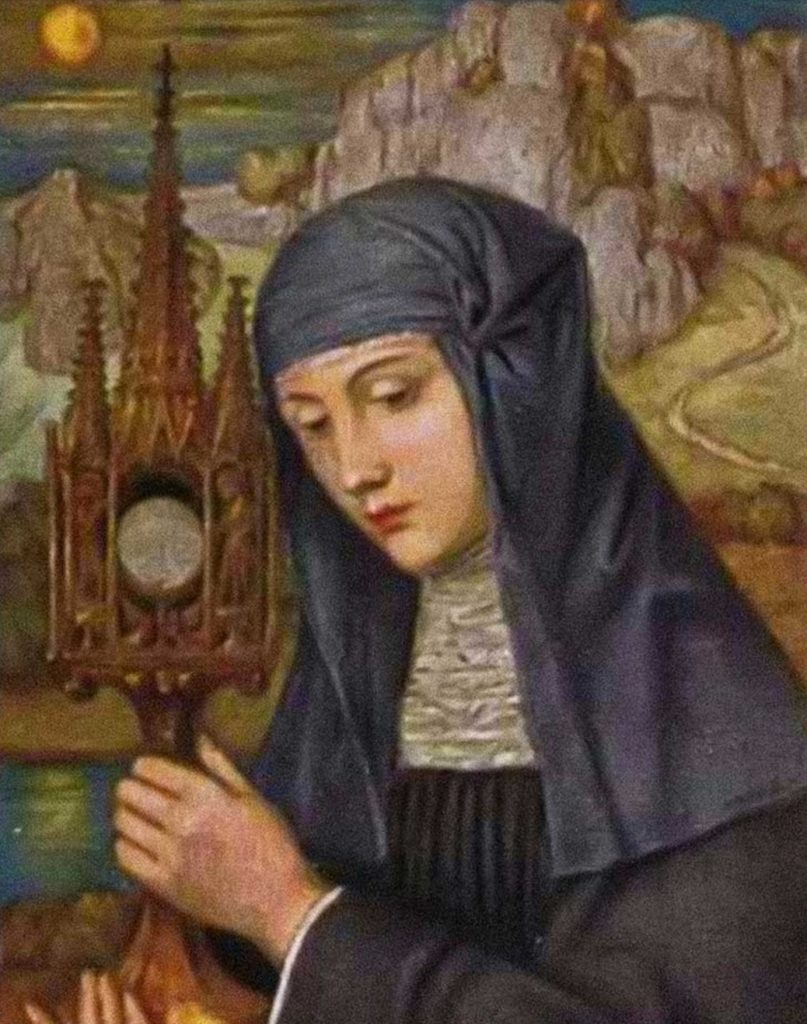
Thursday, May 14, 2020 –
Continuing with our basic primer on the Eucharist and Mass…
What else do we know about the Eucharist?
The Eucharist is “the source and summit of the Christian life.” (CCC 1324) All the other Sacraments point towards the Eucharist. The whole spiritual good of the Church, Christ Himself, is contained in the Eucharist.
The Eucharist is the sum and summary of our faith (CCC 1327). Everything we believe is in the Eucharist, and the Eucharist confirms all we believe!
We must therefore consider the Eucharist as (CCC 1358):
- “Thanksgiving and praise to the Father”
- “The sacrificial memorial of Christ and His Body”
- “The presence of Christ by the power of His word and of His Spirit”
Why do we need the Eucharist?
It unites all who share the Eucharist into one Body of Christ (see the Fruits of the Eucharist). It increases our internal strength and our spiritual graces so we can carry on our spiritual fight. It increases our charity to others.
The Sacrament of the Eucharist also brings forgiveness of venial sins. It preserves us from future mortal sin by helping us to walk a good path, but it does not forgive mortal sins. “Individual and integral confession of grave sins followed by absolution remains the only ordinary means of reconciliation with God and with the Church.” (CCC 1497)
What are some names for the Eucharist?
There are nine names listed for the Eucharist in the Catechism of the Catholic Church.
- Eucharist (CCC 1328) – It is an action of thanksgiving to God. It recalls the Jewish blessings that proclaim God’s works: creation, redemption, and sanctification.
- The Lord’s Supper (CCC 1329) – The connection with the supper which the Lord took with His disciples on the eve of His Passion (His last supper / THE Last Supper). It anticipates the wedding feast of the Lamb (Christ) in the heavenly Jerusalem.
- The Breaking of Bread (CCC 1329) – Jesus used this, part of a Jewish meal, during the Last Supper. Because of this, the disciples will recognize Him after His Resurrection.
- The Eucharistic assembly (CCC 1329) – Because it is celebrated when we (the faithful) are all assembled (gathered) together at Mass.
- The memorial of the Lord’s Passion and Resurrection (CCC 1330) – He commanded us, “do this in remembrance of me.” From the beginning, the faithful have been remembering the Lord’s Passion and Resurrection by breaking bread just as Christ did at the Last Supper.
- The Holy Sacrifice (CCC 1330) – It makes present the Sacrifice of Christ the Savior and includes the Church’s offering. Christ’s Sacrifice surpasses (is greater than) all the sacrifices of the Old Covenant. Similar terms used are: Holy Sacrifice of the Mass; “Sacrifice of praise;” Spiritual Sacrifice; and Pure and Holy Sacrifice.
- Holy and Divine Liturgy (CCC 1330) – The center of all of the Church’s liturgy and the most intense part of the liturgy is found in the Eucharist. Similar terms used are Sacred Mysteries and Most Blessed Sacrament. The Most Blessed Sacrament is the Sacrament of Sacraments—the summit (peak, top) of all of the Sacraments! The Eucharist reserved in the Tabernacle is called by this name (Most Blessed Sacrament). The Tabernacle is the gold (usually) box that “houses” Christ (CCC 1379). The Tabernacle should be in a worthy place because Christ is really present.
- Holy Communion (CCC 1331) – We unite ourselves to Christ. Similar terms used are: The Holy Things (the first meaning of the phrase “communion of saints”); the bread of angels; bread from heaven; Medicine of Immortality; and Viaticum. Viaticum is also Communion given to a dying person or a person in danger of death.
- Holy Mass (CCC 1332) – Each Mass celebrated on Sundays concludes with sending the faithful out into the world to fulfill God’s will in their daily lives.
What are the “Fruits of Holy Communion”?
The Sacrament of the Eucharist gives us many gifts. We call these gifts the Fruits of Holy Communion:
- Holy Communion increases our union with Christ. This is the most important fruit because we want a good and close life with Christ (CCC 1391).
- A share in the eternal life and Resurrection Christ promised is given to all who participate in the Eucharist (CCC 1391).
- The Eucharist preserves, increases, and renews the life of grace we received at Baptism (CCC 1392).
- Holy Communion separates us from sin. The Eucharist can only unite us to Christ by cleansing us from past sins and protecting us from future sin (CCC 1393).
- Strengthens our charity and wipes away venial sins(CCC 1394).
- Protects from future mortal sin because we grow in a deeper friendship with Christ (CCC 1395). We can still make bad choices, but the more we grow in our relationship with Christ and share in the life of Christ, the more we want to make better choices. It becomes more difficult to turn away from Him because we begin to love Him more and more.
- The Eucharist unites the faithful into one body—the Church (CCC 1396).
- It commits us to serving the poor, our brethren in Christ (CCC 1397).
- We are committed to and pray for all Christian unity (CCC 1398-1401).
Next, we are going to start getting into the mechanics and “how tos” of receiving the Eucharist. Stay tuned…
Saint Juliana of Liège, pray for us!
